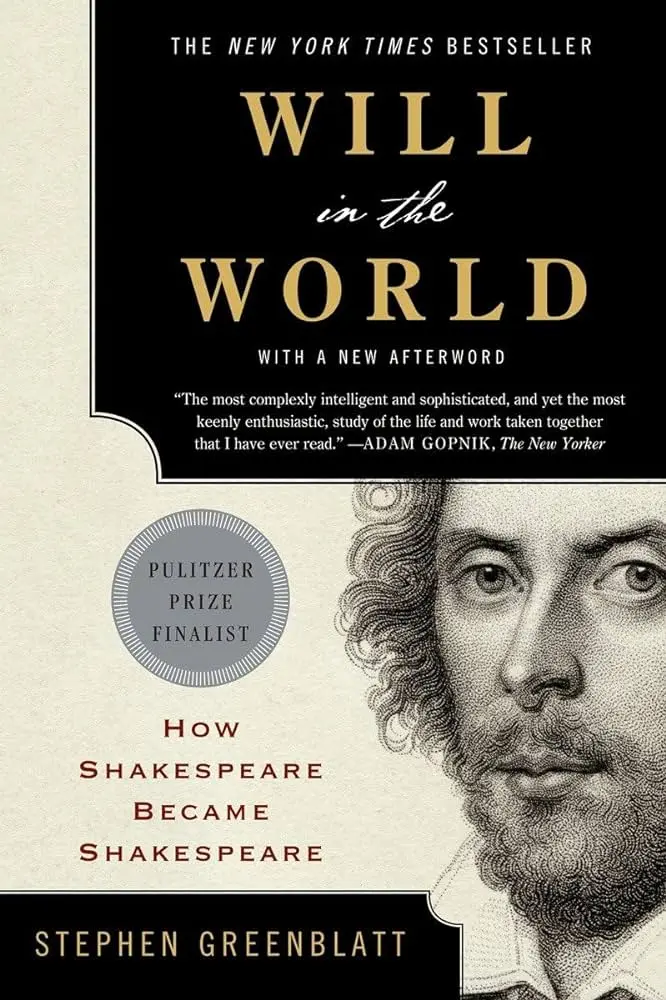Unraveling the Mystery of the Bard
A Fresh Perspective on the Bard
“Will in the World: How Shakespeare Became Shakespeare” by Stephen Greenblatt is a captivating journey into the life and times of William Shakespeare. As someone who has always been fascinated by the enigmatic figure of Shakespeare, I was eager to dive into Greenblatt’s richly detailed biography. What sets this book apart is its ability to weave together historical context, literary analysis, and imaginative reconstruction to offer a fresh perspective on the Bard’s life.
Greenblatt begins by setting the stage in Stratford-upon-Avon, Shakespeare’s birthplace. Through vivid descriptions and meticulous research, he brings to life the small market town where young Will grew up. The book explores the cultural and social influences that shaped Shakespeare’s early years, from his family’s financial struggles to the rich tapestry of local folklore and traditions. This foundational context is crucial in understanding how these early experiences informed Shakespeare’s later works.
Reading about Shakespeare’s formative years reminded me of how our surroundings and upbringing can profoundly impact our creative pursuits. Greenblatt’s narrative made me reflect on my own background and the various influences that have shaped my perspective and interests. It’s a testament to the idea that great art often springs from the interplay between personal experience and broader cultural forces.
The Education of a Genius
One of the most intriguing aspects of “Will in the World” is Greenblatt’s exploration of Shakespeare’s education. While much about Shakespeare’s schooling remains speculative, Greenblatt pieces together historical evidence to provide a plausible account of his learning. The rigorous curriculum of the Elizabethan grammar school, with its emphasis on Latin, rhetoric, and classical literature, played a significant role in shaping Shakespeare’s literary genius.
Greenblatt delves into the specifics of what young Will would have studied, from the works of Ovid and Virgil to the rhetorical exercises that honed his linguistic skills. This detailed examination of Shakespeare’s education offers valuable insights into the intellectual foundations of his plays and poetry. It’s fascinating to see how the classical texts and rhetorical techniques he mastered as a student would later surface in his writing.
Reflecting on this, I couldn’t help but think about the importance of education in nurturing talent and creativity. Shakespeare’s story underscores the value of a solid educational foundation and the lasting impact it can have on one’s life and work. Greenblatt’s detailed account of Shakespeare’s schooling made me appreciate the rigorous training and intellectual curiosity that contributed to his extraordinary achievements.
The London Stage
Shakespeare’s move to London marks a pivotal moment in his life and career. Greenblatt vividly portrays the bustling, vibrant city that became the epicenter of English theater. The transition from Stratford to London was not just a geographical shift but a profound transformation in Shakespeare’s life. The book explores how the dynamic and often cutthroat world of the London stage shaped his career and influenced his writing.
Greenblatt paints a vivid picture of the theatrical scene in London, from the rivalries between playhouses to the diverse audiences that flocked to see the latest performances. He delves into Shakespeare’s relationships with key figures in the theater world, including his collaboration with the Chamberlain’s Men and his interactions with contemporaries like Christopher Marlowe. These insights provide a rich context for understanding the challenges and opportunities Shakespeare faced as he established himself as a playwright.
Reading about Shakespeare’s London years made me think about the importance of environment and community in fostering creativity. The vibrant and competitive atmosphere of the London stage pushed Shakespeare to innovate and excel. Greenblatt’s narrative captures the excitement and energy of this period, offering a glimpse into the world that inspired some of the greatest works in English literature.
The Plays and the Man
“Will in the World” offers a detailed analysis of Shakespeare’s plays, examining how his personal experiences and the social and political climate of his time influenced his writing. Greenblatt explores the themes and motifs that recur throughout Shakespeare’s oeuvre, from the complexities of power and ambition to the nuances of love and betrayal. He shows how Shakespeare’s works reflect both the personal and the universal, making them timeless and resonant.
Greenblatt’s literary analysis is both insightful and accessible, shedding new light on familiar plays while uncovering connections that might otherwise go unnoticed. For instance, he draws parallels between Shakespeare’s own life and the characters he created, suggesting that many of his plays are infused with autobiographical elements. This perspective adds depth to our understanding of Shakespeare’s work, revealing the intimate relationship between the artist and his art.
Reflecting on this, I was struck by the way great writers often draw from their own experiences to create works that speak to universal truths. Shakespeare’s ability to transform his personal struggles and observations into compelling drama is a testament to his genius. Greenblatt’s analysis reminds us of the enduring power of literature to illuminate the human condition and connect us across time and space.
The Influence of Elizabethan England
Greenblatt’s biography also delves into the broader historical and cultural context of Elizabethan England, exploring how the social, political, and religious upheavals of the time shaped Shakespeare’s writing. The book examines the impact of events such as the Reformation, the rise of the merchant class, and the complex politics of the Elizabethan court. These historical forces are woven into the fabric of Shakespeare’s plays, reflecting the turbulent world in which he lived.
One of the strengths of “Will in the World” is Greenblatt’s ability to connect the macro and the micro, showing how
broader societal changes influenced Shakespeare’s personal life and creative output. For example, the tension between tradition and innovation during the Elizabethan era is mirrored in the themes of many of Shakespeare’s plays. Greenblatt explores how Shakespeare navigated the shifting landscape of his time, adapting his work to reflect the changing tastes and concerns of his audience.
Reading about the historical context of Shakespeare’s work made me think about how writers today are similarly influenced by the world around them. Just as Shakespeare responded to the events and issues of his time, contemporary writers draw on current events and cultural trends to shape their narratives. Greenblatt’s exploration of Elizabethan England highlights the symbiotic relationship between art and society, reminding us that literature is both a product of its time and a commentary on it.
The Enigmatic Shakespeare
One of the most intriguing aspects of Greenblatt’s biography is his exploration of Shakespeare’s enigmatic personality. Despite the wealth of information about his works, much about Shakespeare’s personal life remains shrouded in mystery. Greenblatt pieces together fragments of historical evidence, letters, and contemporary accounts to build a portrait of the man behind the plays. Yet, Shakespeare remains an elusive figure, his true self obscured by the myths and legends that have grown around him.
Greenblatt’s portrayal of Shakespeare is nuanced and multifaceted. He presents a man who was both deeply private and remarkably perceptive, capable of understanding and articulating the complexities of the human experience. The biography suggests that Shakespeare’s ability to empathize with such a wide range of characters and emotions may have stemmed from his own introspective nature. This insight adds a layer of depth to our understanding of his work, suggesting that his genius lay not just in his linguistic skill, but in his profound emotional intelligence.
Reflecting on the enigma of Shakespeare made me think about the nature of artistic genius and the ways in which personal identity can influence creative expression. Greenblatt’s biography is a reminder that great art often comes from a place of deep personal insight and experience, even if the artist themselves remains a mystery. It’s a testament to Shakespeare’s enduring legacy that his work continues to resonate with audiences, even as the man himself remains an enigma.
The Legacy of the Bard
“Will in the World” concludes with a reflection on Shakespeare’s lasting impact on literature and culture. Greenblatt explores how Shakespeare’s works have been interpreted, adapted, and reimagined over the centuries, becoming an integral part of the global cultural heritage. From the stages of Elizabethan England to modern-day theaters and classrooms, Shakespeare’s influence is ubiquitous and enduring.
Greenblatt examines the ways in which Shakespeare’s plays have been adapted to reflect different cultural contexts and historical moments. He discusses the various interpretations of his work, from traditional productions to avant-garde adaptations, highlighting the versatility and universality of Shakespeare’s themes. This section of the biography underscores the timelessness of Shakespeare’s work and its ability to speak to diverse audiences across generations.
Reading about Shakespeare’s legacy made me reflect on the enduring power of great literature. Shakespeare’s ability to capture the complexities of the human experience ensures that his work remains relevant and resonant, no matter the time or place. Greenblatt’s exploration of this legacy is a reminder of the transformative power of art and its ability to connect us to the past while illuminating the present.
A Richly Textured Biography
Stephen Greenblatt’s “Will in the World: How Shakespeare Became Shakespeare” is a richly textured and meticulously researched biography that offers a deep and nuanced understanding of the Bard. Greenblatt’s ability to weave together historical context, literary analysis, and imaginative reconstruction makes this book a compelling and enlightening read. Whether you are a lifelong fan of Shakespeare or new to his work, this biography provides valuable insights into the life and times of one of history’s greatest writers.
If you’re looking for a biography that goes beyond the surface to explore the complexities of Shakespeare’s life and work, “Will in the World” is an excellent choice. Greenblatt’s engaging narrative and scholarly rigor make it a pleasure to read, offering a fresh perspective on a figure whose influence on literature and culture is unparalleled. Check out this fascinating biography and discover the world of William Shakespeare as you’ve never seen it before.
Subscribe to our newsletter and get two free novels!



